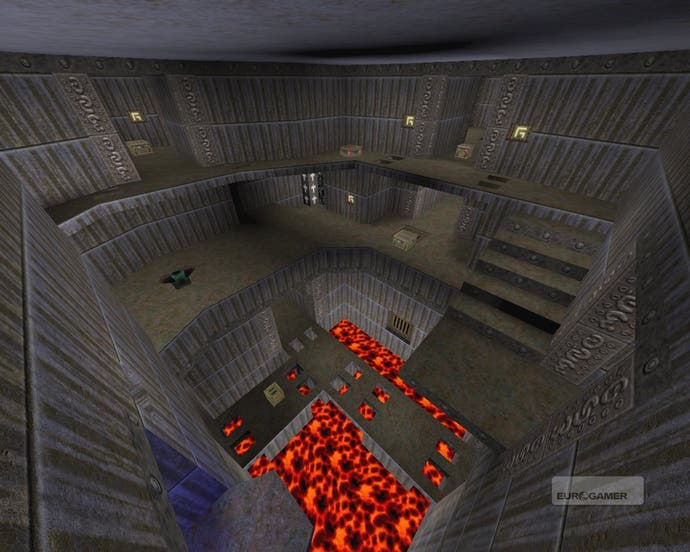Retrospective: Quake
A quirky quiescence.
What I refuse to forget when looking back at Quake is how strange the flavour of the game, both mechanically and in its setting, really is. Quake was a game peculiar for almost refusing to tell a story, and setting itself in a world disconnected from standard fantasy, sci-fi, military, or post-apocalyptic templates that we see reused so routinely. Today, when every shooter imaginable is hammered across the contorted spine of some story or other, to be dropped in a bizarre world that served as little more than a container for violence and secrets is unusual indeed. Hell, it was unusual in 1996.
While the Dooms were sparse, they still told their tale of space marines versus the occult. Quake 2 and 4 focused on the rather more conventional "Strogg" story of space war between humans and their alien enemies. Quake itself stood apart, practically unexplained. The character was dropped into a byzantine world, and fought for his life, while checking every corner of the spiraling maps for secrets and hidden passageways.
The reason for this weirdness can be found in Quake's difficult and unlikely genesis. It was in fact a failed combat-based RPG. The id team's original plans for something more expansive after Doom quickly led back to a game that was even pacier and more focused on first-person close-quarters combat dynamics than Doom had been.
"It is a rumbling, speeding, frenzied dark masterpiece that deserves never to be forgotten."
But that had not been the original intention, because Quake had even once contained dragons and other trad fantasy standards. The id team's work took a darker turn as the RPG was eroded, but on close inspection you can see the echoes of the RPG-action game that, for a while, id thought it was making. As it turned out they ended up making a slick and minimalist FPS, but the ultra-gothic fantasy overtones remain. Quake is a shooter set not within a science fiction, or really within traditional fantasy, but in some kind of brutal, mechanistic pseudo-medieval realm in between.
This sense of rough-edged, grim fantasy design permeates the shooter, from its environments of clanking metal and rough stone, through to its monsters: savage sword-wielding skeletons, shambling giants that throw lightning-bolts, and Cthulhu-mythos boss characters that lurk in disturbing dungeon underworlds.
It is even reflected in the weapons: an axe, an archaic shotgun, a clonking gatling gun, a nail gun, a lightning gun like a giant magic wand. All this is set against a backdrop unlike normal fantasy Big Bad backstories, and quite unlike the other Quakes' galactic war, and even unlike the exposition-free Mars-demons of Doom.
Quake was set in a dimensional war of some kind, where raiders travelled through sinister "slipgates" to murder in other worlds. There was a whiff of beserk magic to the power ups, and the whole thing reeked of the dead remains of the game it might have been. Quake is a genre outlier in terms of setting and atmosphere, and as such one of my favourite games.

You can see why when people look at the other Quake and Doom games, they question whether a return to these evocative hybrid roots might not be a good idea.
Playing Rage this week has once again seen people raise the nature of id's "derivative" settings, as has happened numerous times in the past decade. Indeed, Rage does borrow heavily from post-apocalyptic cliche, lifted from Mad Max by countless driving and combat games, and most recently carved into our mainstream consciousness by Borderlands and Fallout 3. It seems to have almost no connection to Quake at all.
When contemplating the studio's colourful history of shooting games it's perhaps easy to glaze over the first Quake in the lineage. Not as infamous or as influential on mainstream perceptions as Doom, not perhaps as widely recognised as its first and second sequels, nor as notably disappointing as Doom 3, Quake is the game which is beginning to get fuzzy in our recollections.
It should not, because it is a rumbling, speeding, frenzied dark masterpiece that deserves never to be forgotten. And forget it I will not.
